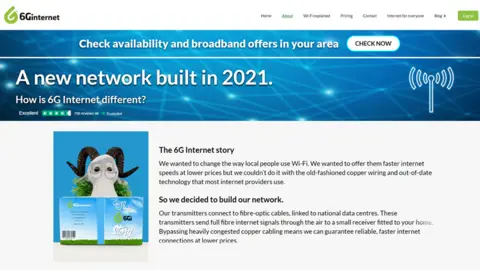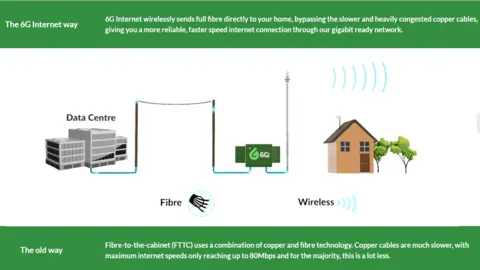Lancashire broadband firm's adverts banned over 6G name - ASA
 ASA/6G Internet
ASA/6G InternetTwo broadband adverts have been banned after they misleadingly implied the existence of 6G, a watchdog has ruled.
Lancashire-based broadband provider 6G Internet has been ordered not to use its adverts in their current form.
The Advertising Standards Authority (ASA) said the firm's name 6G Internet was "likely to mislead in the context of its presentation" in the adverts.
The company said it disagreed with the ASA's findings but it would abide by the decision.
The watchdog said it launched an investigation after a complainant challenged whether the company name misleadingly implied that a sixth-generation mobile network existed and was able to be used by consumers.
The latest available mobile network is 5G.
Issues were raised over a leaflet and the firm's website on 10 February.
In a response to the watchdog, 6G Internet Ltd said it had provided home broadband services under the 6G Internet brand name since 2013.
 ASA/6G Internet
ASA/6G InternetThe firm said internet services provided by 6G Internet were delivered over networks operated by group companies which had full fibre distribution and core networks and used the local access network with fixed wireless technology.
They said that since 2019, the local access network used mast infrastructure in public footpaths.
It said the advertising made clear that "6G" was related to home internet and not to the different generations of mobile technology.
'No confusion'
But ASA said while it understood that the most advanced mobile technology was 5G, it considered that consumers would be aware that the technology was named after each iteration, or "generation" of the technology.
Therefore consumers would make a connection to mobile technology when they saw the company name, it added.
The ASA said: "We told 6G Internet Ltd not to imply a sixth-generation mobile network existed and was able to be used by consumers."
A spokeswoman for 6G Internet said it engaged "fully with the ASA in relation to the complaint, and whilst we are disappointed with the decision, we will respect it".
"We make clear in all of our advertising the download speeds of our services and that we provide home broadband, as opposed to mobile broadband delivered using generations of cellular technologies.
"Whilst we have not found, or been presented with, any evidence that our advertising has caused confusion, it is never our intention to mislead customers.
"Therefore, whilst we disagree with the findings, we respect the role of the ASA and will abide by their decision."

Why not follow BBC North West on Facebook, Twitter or Instagram? You can also send story ideas to [email protected]
